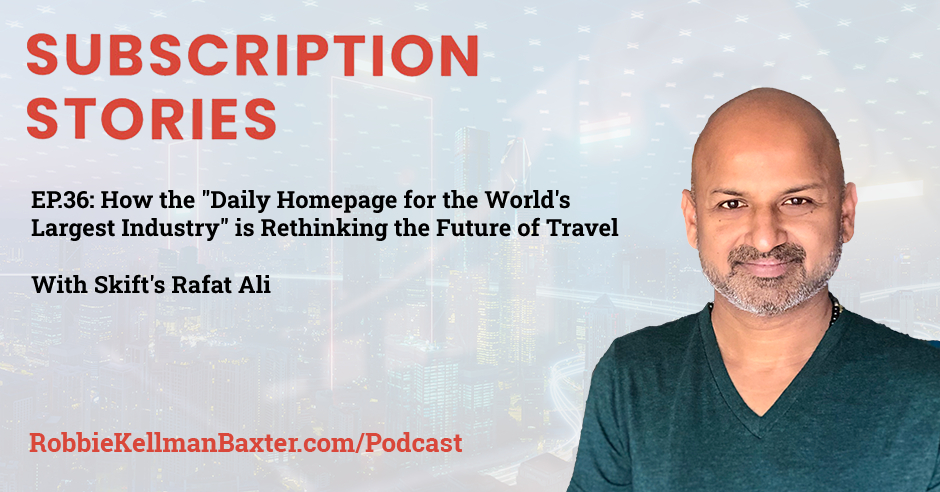
In March of 2020, travel as we knew it abruptly ground to a near standstill. First cruise ships were docked, and then air travel quickly became limited to very special cases. Hotels stood empty except for those that held people in quarantine and the health care workers who cared for them. I think it’s fair to say that no industry has changed more as a result of COVID than travel.
Today’s guest, Rafat Ali, has been at the forefront of understanding these changes, and the massive impact they are having on the entire industry. He is the founder and CEO of Skift, “the daily homepage for the world’s largest industry”, and perhaps the leading news source for travel executives. In today’s conversation, we’ll talk about the key changes happening in the world of travel that affect us all; why he believes in a reader-centric model optimized for travel professionals, rather than advertisers, and Skift’s recent decision to “debrand” their site.
—
Listen to the podcast here:
How the “Daily Homepage for the World’s Largest Industry” is Rethinking the Future of Travel with Skift’s Rafat Ali
In March of 2020, travel as we knew it abruptly ground to a near standstill. First cruise ships were docked, and then air travel quickly became limited to very special cases. Hotels stood empty except for those that held people in quarantine and the health care workers who cared for them. I think it’s fair to say that no industry has changed more as a result of COVID than travel.
Today’s guest, Rafat Ali, has been at the forefront of understanding these changes, and the massive impact they are having on the entire industry. He is the founder and CEO of Skift, “the daily homepage for the world’s largest industry”, and perhaps the leading news source for travel executives. In today’s conversation, we’ll talk about the key changes happening in the world of travel that affect us all; why he believes in a reader-centric model optimized for travel professionals, rather than advertisers, and Skift’s recent decision to “debrand” their site.
—
Welcome to the show, Rafat.
Thank you for having me, Robbie. I am a longtime fan of everything that you write and to your book as well.
Thank you. I feel the same. I wanted to start by introducing the readers to you and to Skift. Can you tell us a little bit about what Skift is and why you launched it?
We launched it many years ago. Skift is the quickest way, not that I am a fan of comparing ourselves to anybody else, but we are the Bloomberg of travel. We have news, research, conferences, and marketing services for the travel industry. The travel industry, between these various constituent industries, airlines, hotels, destinations, cruises, and the large online booking players like Expedia, Priceline or Booking.com and others, is by many accounts, one of the world’s largest industries. It is the world’s largest employer of people if you add all the services are part of it.
For it to not have a modern ‘Bloomberg’ coming into the 2000s was very surprising to me. I have been in the digital media industry for many years. The wave of disruption that has hit business information or B2B in the media, tech and finance industry has not hit the travel industry from the news, research, and digital media perspective on the B2B side. When we launched in 2012, it was novel then, which blew our minds. A lot of trade publications existed that focused on different verticals. Hotels and airlines had their own publications. Nobody was bringing all the travel industry together because consumers do not care about these silos. For them, it is all travel.
They have digital tools in their hands to jump across all the value chains in the industry. When we launched in 2012, we launched with all of the travel and very much focused on how is consumer behavior changing. We were fanatically focused on changing consumer behavior and how that affects the business of travel. We were looking outside-in versus insidery stuff that historically trades have covered. That resonated, certainly.
We were naive. We did not come from the travel industry. We were people that have been in business media, not in the travel industry. We had a somewhat naive view of, “We are going to change how the B2B media looks in the travel industry.” I would humbly say, in several years, we have in many different ways. It is the largest and certainly the most influential travel media company that exists in terms of how not only the travel industry sees itself but how it projects itself to the world. This is in terms of a more forward-looking modern tech-led industry in so many different ways. There were lots of challenges. We have covered that and I am sure we will cover some of it as well.
It takes time for the flywheel effect to come in, but it happens. - Rafat Ali of Skift (@rafat, @skift) Share on XYou came from the digital media world. You saw a surprising lack of coverage of the travel industry. Not just the travel industry as a whole but also helping the travel industry to look at itself through the lens of the consumer.
Correct.
You compared yourself to Bloomberg. I know it is not a perfect comparison but it is a business model that a lot of people understand. One of the things that I know about Bloomberg is it is expensive. They charge a very high fee to have one of their terminals and to have access to their coverage, data and analytics. Can you share what Skift’s business model is and how that has evolved over the last few years?
It evolved a lot in 2020. It is Bloomberg-like in the sense that the general Bloomberg media news is free for anybody. It used to be free until they put up a metered paywall. It is the same for us. We used to be free until July 2020, and we were supported by advertising. Our business, from a revenue perspective, as pre-COVID, COVID, and through all of that, went into disarray for all the reasons you can understand. Travel was the most hit industry on the planet. We were hit as a result, 100% while our revenues come from the industry.
Pre-COVID, we were about 35% advertising. For us, that means branded content or custom campaigns for the travel industry. There was almost 40% from physical conferences. These were back in pre-COVID. There was 20% to 25% from subscriptions. Initially, we started Skift research in 2013. That is original research in discussing what the industry terms syndicated reports on the travel industry. We had two reports a month for people in the industry that wants to know about the travel industry’s deeper stuff.
Do you buy those outright or do you subscribe to the syndicated research?
I do not know why they call it syndicated, to be honest. Let us not get into that. The point is we create the research and people subscribe to them. I do not know why the research industry calls these regular reports syndicated research versus custom research, meaning we are doing it on behalf of the clients. We do not do customer research as a business model for the most part. The goal has always been 1/3, 1/3, 1/3, which is 1/3 advertising, 1/3 events and 1/3 subscriptions.
That has shifted a bit. My thinking of that has shifted, even prior to COVID, which is that subscriptions need to be a bigger part of the business for all the reasons you very well know. You live this life, which is recurring revenue, more stable and predictable. When the flywheel effect happens, it really does happen. It takes time for the flywheel effect to come in but it happens.
Research has been there for us as a subscription thing but we needed more. We have acquired three businesses. We have started Skift Pro. Our main news site used to be free. We launched something called Skift Pro, which has three articles for free. After that, you pay. It is like Bloomberg, New York Times, and a lot of other publications going that route. It is still early but our renewal rates have been 95% on that. It is very high. We jokingly say there was an eight-year free trial going on, and now that the free trial is over, you have to pay for it.
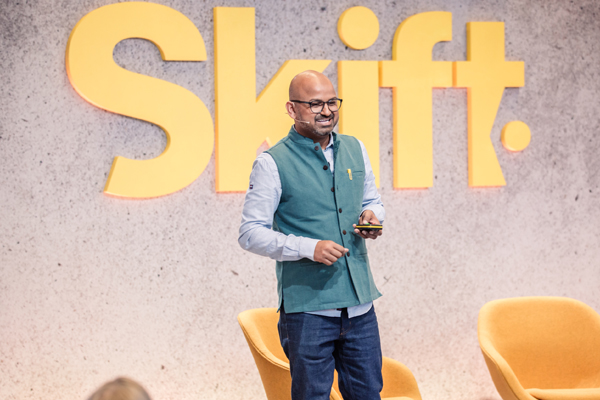
Future Of Travel: If we were not there for the industry in its worst time, covering what they were going through, why should they be for us on the other end of it.
This is not a surprise from my perspective, that your retention is high because you are a business service. You are a business publication. From my perspective, unless either they decide that your content is not worthwhile or not high-quality, they go out of business or they truly do not have any more money in their wallet like there is no money left. They are going to be relatively price-insensitive and loyal. You are part of how they do their job and how they understand the world around them so they can make better decisions. We have never needed somebody to help us understand the world around us more than we have in this era of COVID.
It is the most story-filled time in our lives. It is true in traveling. Can you imagine the stories we had a chance to tell them? I wish we were ten times bigger in terms of resources to cover all the things. We had to let go of 1/3 of our team. We have initially furloughed them and then had to let them go. One of the things we decided not to do or try hardest was to not cut on the editorial side. It is the best time to tell stories. We knew that this was the engine that was going to take us out of this and to the other end.
It has proven like the industry. If we were not there for the industry in its worst time, covering what they were going through, why should they be for us on the other end of it? That is how I processed it. In many ways, we have seen early evidence of that. The industry is coming back. Travel, as you know, has had a very good recovery in fits and starts. It is 2 steps forward, 1 step back or 1 step forward, 2 steps back, depending on where you are in the world.
2021 is still a transition and a strange year, until July 2021, it looked like things are moving back so well. Then August 2021 came with the Delta variant. Things are looking like the concerns on Delta are plateauing out but never say never. We do not know what shape this virus will take. This is by all indications, not just in travel, sometime in 2022, it looks like a good part of the world will figure out how to live with it. If that is the case, then in travel, we need that human connection. Which industry brings humans together with the best? It is the travel industry. We were poised for a great recovery, the industry itself, and hopefully, we as well.
You mentioned that you acquired a couple of businesses as you doubled down on being the voice of the travel agent industry and the bringer together of trends and information. What were some of those acquisitions? Can you share why you did that?
The idea was to build an omnibus news service or news brand that is at the top of the funnel. At Skift.com the Daily Newsletter is still free. The site still has three stories free. That is our big-picture traffic. How do we then build verticals within the travel industry? We bought something called Airline Weekly, which existed fifteen years prior to us buying it in 2018. It is a newsletter that people called The Economist of the Airline Industry.
Once a week, it is the one thing Delta, United Seair, Air France-KLM. I am checking them because I know 100% for sure they read it every week. It is the one thing in the industry that they read to get up to speed with busy senior executives. The industry does not read news like you and I obsessively do. They are aware this is their business. This is the one they read, research/analysis for the airline industry.
That was a purely subscription-based newsletter. That was run by three folks that were there from the start. It plateaued in terms of their ability to scale it. We bought it with an idea that we can build a conference on top of it. That is a model for us. We will take newsletter-heavy small companies because that is what we can afford to buy. We cannot buy bigger companies that are not certain. We bring it on a modern tech stack, marketing stack, design, sensibility, sales machinery, and scale it, either scale the publication itself or add things like conferences to it as well. We did that with Airline Weekly.
We bought EventMB, which focuses on the event industry, so the business of events. It focuses on event planners and event managers. That is not a subscription site. The event industry and event planners are not a group of executives or professionals who would pay for it. It is all very advertising-driven. That was not a subscription thing but again, vertically focused on one sub-sector of the travel industry.
We need that human connection. Which industry brings humans together the best? It is the travel industry. - Rafat Ali of Skift (@rafat, @skift) Share on XWe bought Daily Lodging Report, which is a newsletter in the hotel industry. It has two newsletters a day, one for North America and one for APAC. That is a purely subscription-based business. There is a husband-and-wife team that had been doing it for many years. We are almost done with the tech and finance transition operations for it. Its resonance is incredible like every big CEO in the hotel industry.
We put this out as a quote. Wyndham is one of the largest hotel companies. The Wyndham CEO said to me that he has read every word of the newsletter for many years. I do not know how that is possible. That was his unsolicited call when I was doing diligence on the company. I emailed him to say, “What do you think? Should we buy it?” He emailed me back. The point is that is a subscription newsletter that hopefully, we will build, and then add a conference business on top of it as well at some point.
It speaks to a couple of trends in the world of the membership economy that are important. One of which is, you know who your audience is. You continue to layer in benefits to make it more relevant, both in terms of adding new sources of content and new ways of letting members achieve their goals. There is content, commerce, events and community, the ability to meet other like-minded people and other people in the ecosystem.
A lot of organizations miss the opportunity to layer in value because they are so focused on their products, “We are a media company. We write articles. We put out videos,” as opposed to being, “We are in the business of helping a particular group of people understand the world around them.” In which case, it certainly helps people understand the world around them to give them access to other people like them and the journalists themselves. I admire that.
I talk a lot about launch, scale, lead. You launch your business. You scale it. Once you have the minimum viable product and you know it is working, that is when you invest in technology and infrastructure. The last phase is staying relevant. How do you maintain your leadership position? You have alluded a couple of times to this challenge that the travel industry, while it is a very old industry and while many of the publications have been around for a long time, have not necessarily evolved to deliver their value in the most efficient, modern and relevant way possible. That is something that you have excelled at.
We constantly think about not only how we cover things but also how we deliver them. Ultimately, at the end of the day, what we came down to, we experimented with a bunch of stuff and people want stuff in email. We will send them stuff in email day in, day out because email, as you very well know, in B2B or the business world is the main source of delivery in general. We have experimented along the way with everything, including Twitter, Facebook, LinkedIn and stuff. LinkedIn is pretty good for us. We use that quite a bit.
We have also changed the times. For us, it is surprise and delight. Not that we use that term untimely but the marketing industry understands. How do we continue to come up with new ways of looking at the industry and new ways of slicing and dicing? We have coined different terms like overtourism. This was a big term before COVID. Overtourism is the glut of tourists around the world that are in cities like Venice, Barcelona, and New York that are overwhelmed by tourists. This is pre-COVID, so things have changed a little bit.
Overtourism became a single verb. The Telegraph in the UK called it the Word of the Year in 2018. We coined it in 2016. Not that the concept did not exist, but we put a word to it and it became a consumer word. Overtourism as in too many tourists are in the world. How can the world, which is dealing with all kinds of challenges, including climate change and all the others be dealing with it? That debate is different. I am sure there is a different episode, at some point, that will talk about it.
The point is how do we keep coming up with new ways of looking at travel? For us, innovation means constantly coming up with new ways of looking at the world. Innovation does not always mean tech. One of the mistakes industries or companies make is they equate innovation to either tech, startups or both. For us, it is how do we constantly keep coming up with new ways of looking at the world. It is a creative challenge as opposed to a tech challenge.
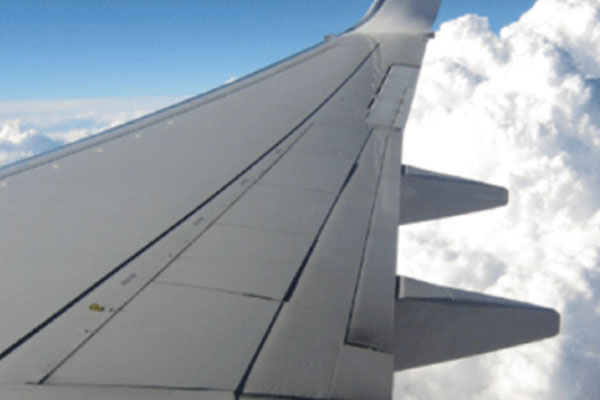
Future Of Travel: You cannot find an Airbnb anymore in the holiday season because they are growing so fast. People have shown that they want their own spaces.
You alluded to the fact that overtourism is not as big a problem with COVID. How has COVID affected your business, members, subscribers and readers?
In all possible ways, it has changed many of things for us. It hit us badly in terms of revenues. In terms of March, April, May, June 2020 was really scary for us as it was for the travel industry. I have said this publicly, that we were three weeks away from running out of money. At one point, I do not remember the exact date but it was sometime in April 2020. We had 65 people as a company pre-COVID. We let go about 1/3, so we are down to about 40 or so folks. It hit us right where it hurts. That is keeping in line with where the travel industry was hurt in 2020.
It has also changed our thinking on subscriptions. We now aspire to be a subscriber-first company. We are not there yet. Subscriptions are not the biggest part of our business but it is getting up to 25% to 30% and hopefully, crossing a bit 35% in 2022 and then more. For us, it is not just subscriptions but it is also ticket revenues for our conferences. That is also recurring to the extent that people come again and again.
What you would consider subscriptions, we consider, we split brand-supported revenue and direct from our audience revenue, also those tickets for our conferences. That split is beginning to look quite good in terms of balance. At this point, we were 60/40, 60% brand supported, 40% come from our set of readers. Since launching Skift Pro, we have rebuilt the tech stack. What happened and this happened at a lot of other companies is we built a lot of the tech that we used to.
For instance, for events, we used to use third-party event registration software, whether it was Eventbrite, CVENT, or all the other companies that I am sure either you or your audience have heard of. We build our own event registration system, which is not plugged into our subscription system as well. We rebuilt our subscription stack prior to COVID. We were about to launch it when COVID hit, and we postponed it a few months.
We have a single tech stack and a single view into the consumer of what they are reading, what they are buying, are they subscription or ticket, and everything that they do. It all plugs into HubSpot for us. We have a single view of the customer there as well. That has been fascinating for us. It is still early. We are still a tiny company. There is still a lot more to do.
I am sure it is still early and you are still enjoying all of this new data and having this integrated view of your readers and your audience. Can you share a tidbit or two of some of the things you have been able to see from having this unified view?
What we knew and suspected, which is email, which is our daily email newsletter, is the primary vehicle for anything, whether they buy subscriptions or tickets for the conference. We used to hear from surveys that we used to do. Now, we know empirically that that is what happens. Obviously, they read stories on Skift through the email newsletter. That is our most loyal audience. I am a big fan of the Rule of 1/3, which is 1/3 of your audience will do anything you say, 1/3 are still on the fence, and 1/3 do not care. What you do is end up caring for the middle 1/3, which is people who are mad but they would do things if you persuade them, and then bring them over to the 1/3 very loyal side.
Having a single view into the consumer allows us to focus on that middle 1/3. The other 1/3 who will not buy anything from you will continue to use the anonymous mode in their browser to go over the paywall. I am sure you have heard this from other publications where you take their link and put it into an anonymous browser, then you can read it, even if there is a subscription paywall.
Innovation is a creative challenge as opposed to a tech challenge. - Rafat Ali of Skift (@rafat, @skift) Share on XIf New York Times has not been able to solve it with the 600 tech people that they have in their team, we have not too. We have not been able to solve how to close that loophole from a tech perspective. It has allowed us to be able to see who are the real loyalists who will buy anything from us and anything we do. The price-insensitive nature of this audience is a lot more apparent for us now.
We are able to package more. That is the next challenge for us now that we have 3 or 4 different subscription-based services. We have X number of conferences. How do we make sure we bundle those two large companies like Marriott, Expedia, or anybody who wants to buy all of these for their employees? We are not there yet. We are beginning to do manually being able to package that. From a tech perspective, it is easy to make sure that the onboarding happens such that they can access multiple things. Historically, this publication was in this silo. This publication was in that silo but now it is all a single stack.
Those are huge challenges, especially for long-standing organizations and organizations that have grown through acquisition where you have all of these little silos. You have a single forever promise to that customer, “We are going to help you thrive in your business by understanding the world around you better.” Especially with that 1/3, they say, “Give me your best.”
In the simplest way possible. Do not make me jump through ten hoops on like logging into this versus logging into that. We have solved the technical part of it. It is the execution that we are on that journey.
You talked about the 1/3 that is willing to pay for the value. You talked about the 1/3 that is open to paying for the value, and then the 1/3 that is probably never going to pay for the value.
In the industry, some of them, a little bit, stepped outside the industry, read it and are fine with it.
For that group, I imagine that part of it is hard to keep them out completely if you are going to give three free articles. The other thing is, they are eyeballs. We have not talked about advertising. I know that for a lot of people reading who have subscription revenue and want to grow their subscription revenue. Many of them also, like you, still count on some brand revenue and advertising-driven revenue from partners. How do you balance those two as you invest more in optimizing around your audience revenue? How do you make decisions to stay relevant for your advertisers?
One of the other things that have happened is advertising. This is true across a lot of media companies, not just in travel. Travel is coming back from advertising spend. Obviously, 2020 was tough. Advertising for a lot of the media publishers has been booming. Tech companies have money to spend. There are challenges that I am sure you are also aware of on cookies going away or privacy things coming in such that first-party data becomes so much more important for publishers, sponsors or companies that are spending money on advertising.
For us, that value proposition has been proven. You can use our tech all day long, but the reality is that a lot of those practices are being frowned upon now. You have to go first-party to understand what your customer habits are or your potential customer habits are. That is our proposition. We do custom work for companies to position them in the industry. We are not a consumer so our advertising campaigns are aimed at the industry.
I will give a quick example. Marriott’s luxury division wants to position itself to the travel agents in the travel industry. They bought Starwood. They have a full luxury portfolio. They will come to Skift to say, “Can we work across your channels and some conferences and create a whole program around that?” Our SkiftX, which is our brand content studio, works on that to create that.
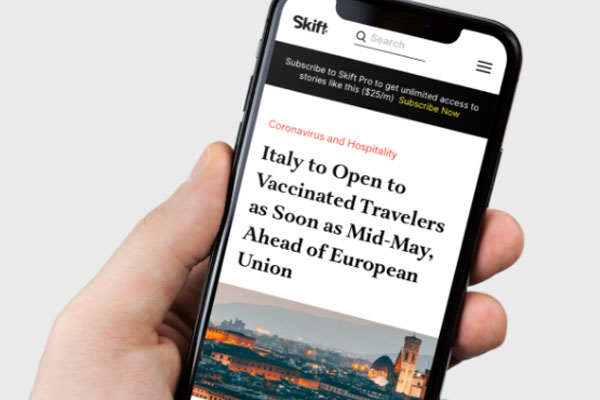
Future Of Travel: Innovation does not always mean tech. One of the mistakes industries or companies make is they equate innovation to either tech, startups, or both.
As the travel industry is coming back, that money is coming back. That continues to be. We have a better sense of the consumer now because we know the subscribers a lot better. One of the things we have also done is we have redesigned the whole site. I term it debranding. If you look at Skift now versus what it was when we relaunched it, it looks completely different. It is completely clean.
You have changed your focus so that it is how would a reader want to access your content. Rather than, “We have acquired these three brands. We are going to keep them separate for you. We added this other thing and then we added this other thing. We stick it in.” You took a step back and said from the reader’s perspective, “What is the best layout?”
What are they looking for? Does it matter to them that we bought all these that what we think is great? Who cares? For them, it is a solution, “I am a hotel owner. I need daily news on the hotel industry.” Daily Lodging provides that. Let us present it as that versus we bought the Daily Lodging Report. It is a newsletter that everybody reads. That is a very egocentric brand-driven view versus what are the solutions that people are looking for. That is how we have rethought, even at a small scale as a small company like ours. Hopefully, this translates as we grow as well.
You have made a lot of changes. I know you are continuing to push forward. You said earlier that one of the key value propositions of Skift is that it is a very modern, forward-looking view of travel. No one has a crystal ball, but you come pretty close, at least in this space. You committed to trying to answer 100 questions on the future of travel.
I ended up at 114.
What were some of the biggest surprises that you have seen? What are some of the things that have come true for business travelers and consumers?
You are talking about travel, not us as a company but the industry itself. One of the things, I am sure you went for the same thing, domestic travel, meaning us traveling within 2 to 3 hours of where we live, the road trip was a huge boom. Generally speaking, national park attendance was going down prior to the pandemic from a historic perspective. That has taken the other route, which is national parks are booming. In many cases, they are overloaded. During summer, that was the case as well.
The resurgence of domestic travel was welcome. I do not know if it was a surprise but it was certainly much needed. Many small businesses, not just in the US but anywhere in the world that are a huge part of different economies, depend a lot on domestic travel. While the industry market itself is a globetrotting world, the reality is this is what should be driving a huge part of the industry. It also helps climate change, meaning people are not crisscrossing everywhere and putting a huge carbon footprint in the world. That was surprising and welcomed.
The other thing was there was a big debate on companies like Airbnb and others, “They are dead. Who wants to stay in other people’s homes? This is COVID. Nobody wants to do that.” They went through a much bigger version of what we went through, which is this existential crisis. Look at them. You cannot find an Airbnb anymore in the holiday season because they are growing so fast. People have shown that they want their own spaces and certainly, whether it is Airbnb or ten other smaller companies like them. That has been a surprise.
People have shown that they want their own spaces, whether it is Airbnb or ten other smaller companies like them. - Rafat Ali of Skift (@rafat, @skift) Share on XThe other surprise, and this is more of the industry, but people are booking so late into the process. I am sure this has happened to you if you have traveled. You are waiting until the last minute to book because there is so much uncertainty. There is what the industry calls booking windows. Booking windows, for instance, summer travel would have started before summer. The industry knew how to forecast so that there was the predictability of how many bookings would happen. The booking windows have changed quite a bit.
The question is, “Will it continue?” Even if it does not continue to the level that they are during the pandemic, it will come up to a higher mean. The industry will have to be more flexible for last-minute than historically they have not been, whether it is flexibility in terms of cancellation, rebooking, and all the things that the industry hates because it is last minute and it does not help them. Those are some of the surprises from that perspective.
I have seen those. The nearest local beach hotel, the pricing is astronomical. Many people are not doing European or international travel, and they are trying to stay close to home. The other thing that I have noticed is that everything is fully refundable. You can cancel up to the last minute. It is like free shipping. I wonder if the airlines, the hotels and the travel companies are going to be able to go back to requiring us to book in advance.
It will probably be somewhere in the middle. It would not be as flexible as it is now but it would not be as inflexible as it was prior to COVID.
It is a little bit of a move forward. Do you have time for a quick-fire round before we say goodbye? This was great. These are just a few quick questions. Answer them without thinking too much, whatever pops out. What was the first subscription you ever paid for?
New York Times.
What is your favorite subscription besides your own?
I would still say New York Times. It gives me so much of the world.
The most recent trip you have taken for business and pleasure?
For pleasure, my family and I went to London for the first time. Obviously, we traveled internationally from the US. I had two young boys so that was a whole different level of challenge. It was amazing. For the business trip, I have not yet done a bit. We did our own conference. That was at the TWA Hotel. I live in Queens, so it is only 25 minutes away from it. You could call it a business trip. I have not yet done a business trip since 2020.
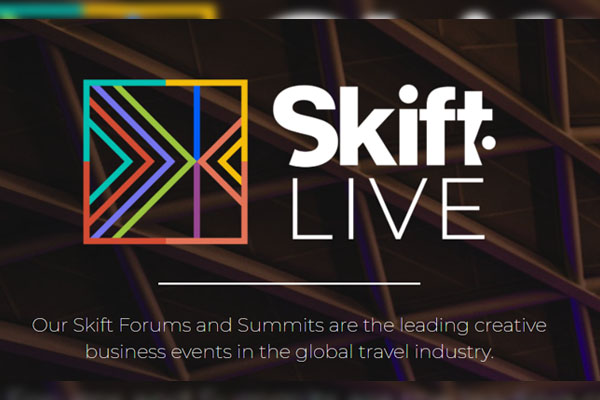
Future Of Travel: As the travel industry is coming back, that money is coming back.
I am going to say that a 25-minute trip does not qualify as a business trip.
The good news was all we did was meet other business people. As you can imagine, in this day and age, it felt so good. Firstly, meeting our team was incredible. That was it.
What is the publication that inspires you the most in terms of how you run Skift?
It is Bloomberg in terms of philosophy on how deep they go political, not because of politics but how they build a free site and how they build their subscription businesses. There is a publication out of the UK called Monocle, which is a men’s magazine, an eclectic global sense of the world. It is called Monocle.com. They have an eclectic creative sensibility. They have nothing to do with travel. They are a consumer publication magazine. To creative sensibility and how they look at the world has inspired my creative sensibility in many ways on how I look at the world of travel in this most expansive sense versus a very siloed, boring industry sense.
Rafat Ali, thank you so much for being a guest on the Subscription Stories. This was a fantastic conversation. I know I took away a lot of gems. Thank you for being a guest.
Thank you for having me. I appreciate it.
—
That was Skift Founder Rafat Ali. For more about Rafat and Skift, go to Skift.com. If you liked what you read, please go over to Apple Podcasts or Apple iTunes and leave a review. Mention this episode if you especially enjoyed it. We read all the reviews because we want your feedback. Thanks for your support. Thanks for reading.
Important Links:
- Rafat Ali, CEO & Founder, Skift
- Skift
- Bloomberg
- Priceline
- Expedia
- Skift Pro
- Skift Daily Newsletter
- Airline Weekly
- Delta
- United Seair
- Air France-KLM
- Wyndham
- Skift’s Twitter
- Skift’s Facebook
- Skift’s LinkedIn
- Telegraph
- Eventbrite
- CVENT
- HubSpot
- EventMB
- Booking
- Daily Lodging Report
- Marriott
- SkiftX
- Starwood
- Airbnb
- TWA Hotel
- Monocle
- New York Times
- Subscription Stories: True Tales From The Trenches on Apple Podcast
About Rafat Ali
 Rafat is the CEO/founder of Skift, the most influential business media company in the global travel sector providing news, research, events and marketing services to key sectors in travel.
Rafat is the CEO/founder of Skift, the most influential business media company in the global travel sector providing news, research, events and marketing services to key sectors in travel.
Previously, he was the founder of paidContent, which he sold to UK’s Guardian News and Media in 2008. Prior to that, he was managing editor of Silicon Alley Reporter.
Rafat was the Knight Fellow at Indiana University, where he completed his Masters in Journalism, 1999-2000. Prior to that he completed his BSc in Computer Engineering, from AMU in Aligarh, India.
Love the show? Subscribe, rate, review, and share!
Join the Subscription Stories Community today:


